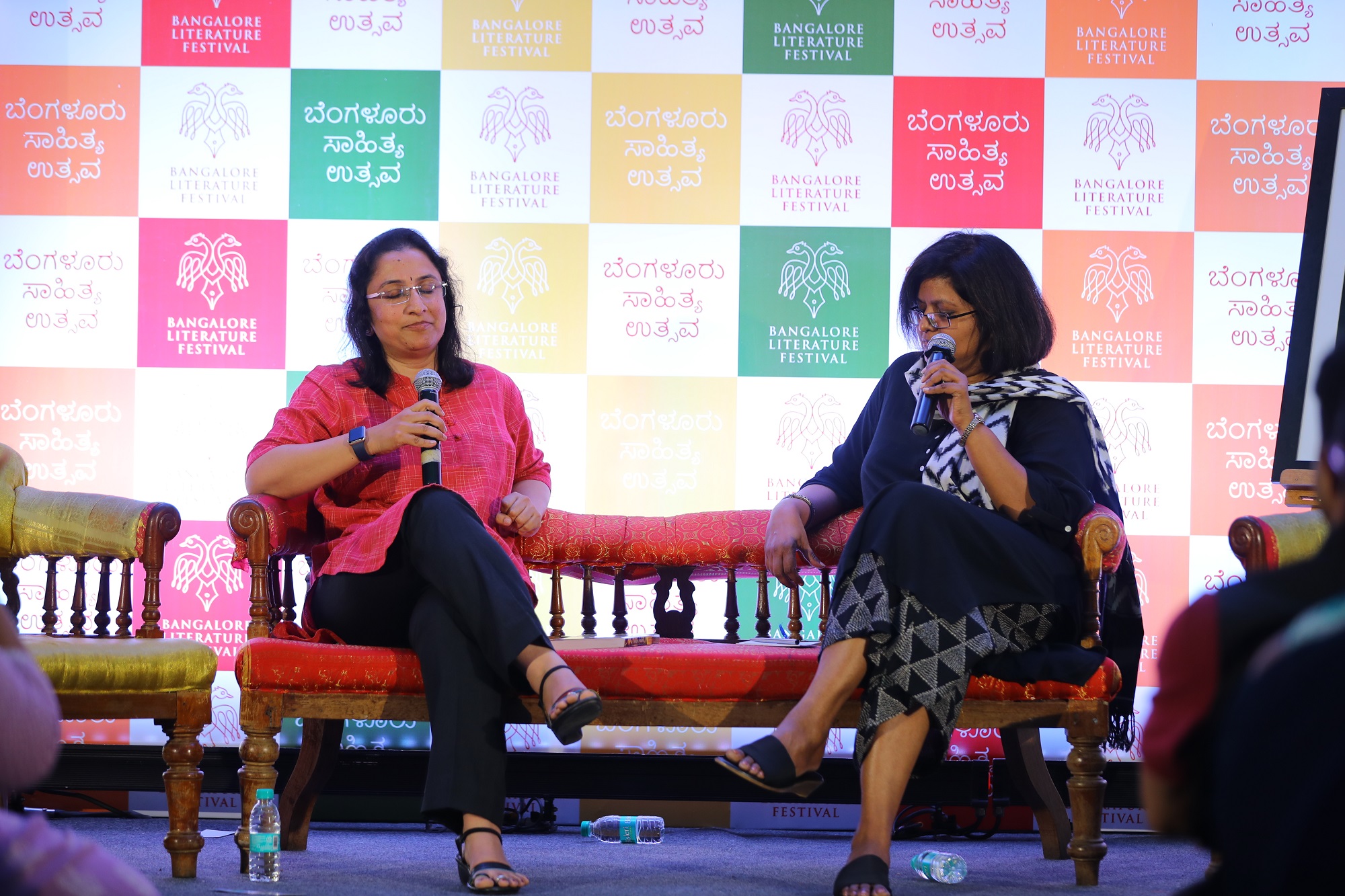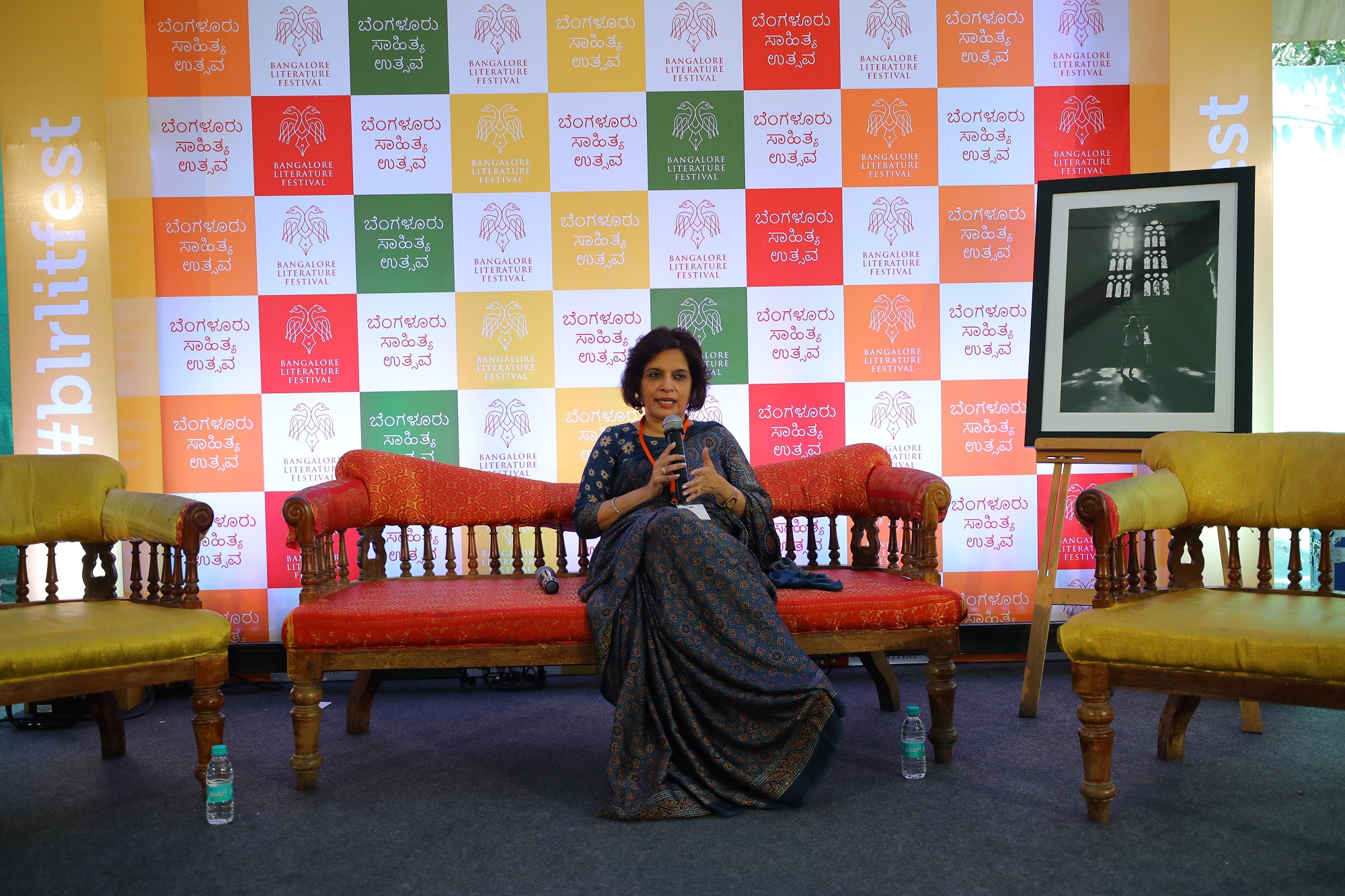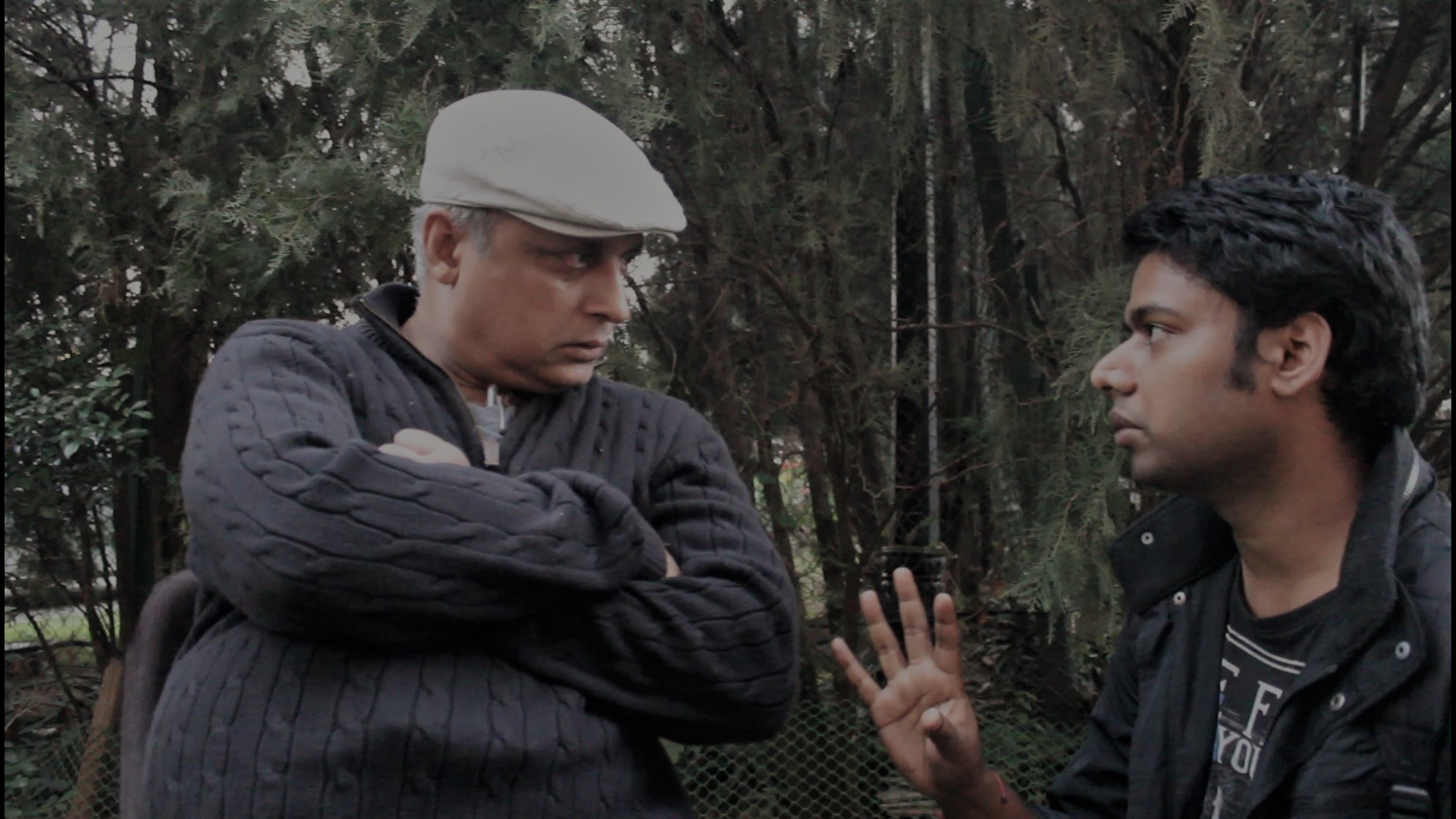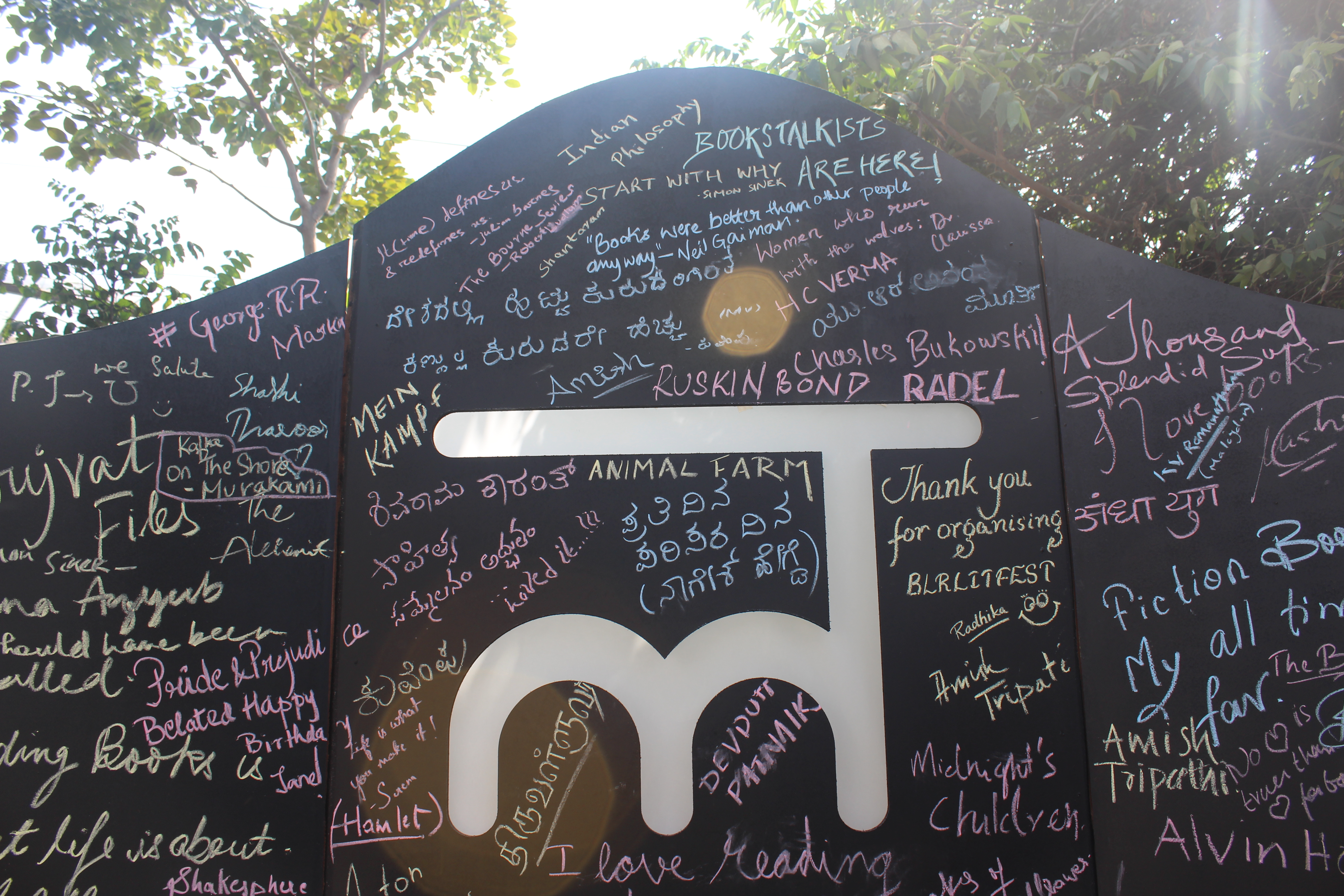Writing involves giving your all and in Issac’s case, a break from regular work to finish his collection of short stories- ‘Buffering Love’. Issac in conversation with RJ Shraddha brought out his journey from Pitch to Page! Continue reading “From Pitch to Page – The Story of ‘Buffering Love’”
Saris or Pantsuits?
Saris or Pantsuits was a conversation between the author, Radhika Nathan, the writer of ‘The Mute Anklet’, and ‘A Time to Burnish’, and a behavioural science expert, Gayathri who loves studying the impact of perceptions on people.
Continue reading “Saris or Pantsuits?”
Tailing Veerappan
“Veerappan was a bloated figure. He was too blown up like a balloon and had to be punctured”, says Vijaykumar who was Chief of the Special Task Force (STF) that was behind the encounter of the dreaded bandit Veerappan during Operation Cocoon in 2004. Vijaykumar has written a book titled ‘Veerappan: Chasing the Brigand’ where he talks in detail about the hunt for Veerappan. Kanwaljit Deol, another IPS officer talks to Vijaykumar about the book and Operation Cocoon in a session titled, ‘Tailing Veerappan’. Continue reading “Tailing Veerappan”
Lanka’s Princess, Vamp or Winner?
“Without Shurpanakha, there would be no Ramayana, don’t you think?” asked Kavita Kane. “There wouldn’t have been a war if Shurpanakha hadn’t met Ram and Lakshman in the forest. She’s the main trigger of the entire series of events in Ramayana. Yet, there is so little we know about her!” lamented Kavitha.
The female novelist, who recreated the entire story of Ramayana keeping Shurpanakha as the main character and the focus of all the attention, attended the final day of Bangalore Literature Festival and shared some of her thoughts on the character as well as the book.
The author spoke about her purpose and motivation behind choosing Shurpanakha as the focal point of this epic. The author believes that, if we see Shurpanakha as a vamp then we would judge her in a negative way. “Why do we have to do that?” she asks. If we start seeing her as a victim, somebody who suffered from extreme physical violence, then the paradigm shifts in favour of her. When we change perspectives, Shurpanakha becomes an entirely different person.
Breaking the stereotype is the key, mentions Kavitha. We have a choice of not always imagining Shurpanakha as a negative character by simply justifying her motivations and subsequent actions. Attraction is a human phenomenon and we, as considerate people, can make way for that phenomenon and simply accept that Shurpanakha was attracted to Ram. There should not be anything so wrong, that her nose had to be cut-off. Of course, Lakshman cut her nose when she tried to attack Sita. But the author maintained that, though Shurpanakha did make a mistake, in reality, it is very common for any human to make such a mistake.
If the characters portrayed in mythology are shown with all of their traits and if all shades of their personalities are shown, then it is much easier to forgive Shurpanakha for what mistakes she had committed and the world as it is today – filled with eternal prejudice, bias and discrimination against a woman who had committed a simple human error – is something the author wishes to change.
Kavitha goes on to elaborate that, evil has no gender and no colour. Darkness cannot be stereotyped into evil and fairness cannot be stereotyped into the divine. In the same light, the mere name Shurpanakha should not be stereotyped into something pure evil. Breaking perceptions and getting rid of norms and stereotypes is all this book is about, said Kavitha.
The author went on to say that, even though Shurpanakha is a fictional character, we can still draw parallels with real life. But for the audience to believe in a work of fiction, the author cannot simply use her figment of imagination and create a character so different that the audience cannot relate to. The author indeed has to research and the portrayal of any fictional character is made, to a lot of extents, to fit the societal expectations of the reader. Balancing facts with fiction is the true challenge when it comes to writing mythology inspired novels, she concluded.
About the Author: Soumik Seth is an avid follower of music, current affairs, stock market, economy, and filmography. He currently writes for Bookstalkist.
Writing for Children – Contemporary Issues Vs Traditional Stories
‘With every book I am pushing the line, thinking how much can I get away with’, said Ranjit Lal, an author who addresses even the not so pleasant topics in Children’s literature. Th session ‘Writing for Children’ saw two of our favourite authors on that genre having a cordial and warm discussion on the Children’s literature. Reena Puri and Ranjit Lal argued for traditional themes vs the contemporary themes in Children’s literature. The session seemed almost like storytelling episode. Their well-modulated voices and hand gestures might have reminded more than a few in the audience of their favourite English teachers.
Sudeshna Shome was the moderator of the session. She knew how to ask the questions that can elicit replies that might long live for the session. To all of you who thinks Children’s literature is not significant enough to discuss, let me remind you of the vocabulary, the morals, the adventure and imagination that only a book can give to a child. I will also add patience to the list as I have seen my little brother sit still only when he had a Balbhumi during his toddler days.
Ranjit Lal whose books are based on contemporary themes confessed how he can’t write on traditional themes as it is a field that he has zero knowledge on. Everyday concern and evils that children need to be educated on are taken up by Ranjit Lal. For instance, one of his books deals with grandchildren learning to cope up with their Grandfather’s amnesia. His books are also noted for the female/ girl centrism. In his book, it is always the girl who guides the boy. He admitted in the session with a grin that it might be the result of growing up between two sisters.
Reena Puri, editor of Amar Chitra Katha emphasised on traditional themes in Children’s literature. She spoke how myth and tradition are used to educate the children on their rich culture. Reena Puri also spoke of their collective attempts to tailor myths and tradition to the present needs in Children’s literature. The westernisation that has happened even in Children’s literature was something both the authors agreed on. Ranjit Lal recounted an incident when he was asked to judge a children’s short story competition. He found to his dismay that all their characters had names like Jack or Jill.
The session also saw Ranjit Lal explaining the absence of parent or adult figures in his stories. They interfere too much. I put them in a hospital or something, he replied to the audience and I am charmed.
About the Author: Vibhuthi Viswanathan is a Potterhead and chocoholic.Curling up with the ‘Balabhumi’ and spinning out tales from its illustrations to her little brother was her first interactions with a book. Although she has moved on from good old BalaBhumi, she still hasn’t stopped twirling words and pauses. She currently writes for Bookstalkist.
Nature and the City
Journalist Dhanya Rajendran moderated a discussion with Jairam Ramesh, Member of Parliament and Harini Nagendra, Professor of Sustainability, Azim Premji University. The session was titled ‘Nature and the City ‘ and the discussion was focused around two books – Jairam’s ‘A life in Nature’ and Harini’s ‘Nature in the City: Bengaluru in the Past, Present, and Future’. Continue reading “Nature and the City”
Border Tales
When a national security expert, a journalist, and a feminist come together to discuss their perspectives on Borders, you can expect some uncensored truths. The session, ‘Border Tales’ saw Bishwanath Ghosh and General Kamal Davar putting across their perspectives on Borders. Ritu Menon was there to moderate the discussion and honestly, the word shuttle she played with Kamal Davar was the much-needed light in the discussion. Continue reading “Border Tales”
India and China: How History is a Fickle Mistress
Author and Journalist, Raghu Karnad quotes journalist James Cameron as he sits down with India’s first woman Foreign Secretary Nirupama Menon Rao to discuss India and China. India and China: How History is a Fickle Mistress – the session could not be more aptly titled given the immense depth of the relationship between India and China. Continue reading “India and China: How History is a Fickle Mistress”
Nationalism, Populism and the Threat to the Global Liberal Order
6pm on 29th October | 2nd Day of the Bangalore Literature Festival – connoisseurs of literature moved through different directions; some took the left, another set walked from the right, and a few had to take the centre (political correctness?). Notwithstanding the route wished, granted, or taken, the feet of democracy converged at ‘Speak Up’ venue of the Bangalore Literature Festival to register their attendance for the numero-uno on the best-selling sessions list of the day titled ‘Nationalism, Populism and the Threat to the Global Liberal Order’.
Continue reading “Nationalism, Populism and the Threat to the Global Liberal Order”
#Blrlitfest 2017 is here
The Bangalore Literature Festival has arrived early this year. As we gear up for some scintillating conversations and intellectual gossips, I am all nostalgic about #Blrlitfest2016. The festival last year covered a diverse range of topics including history, politics, geography, biography, popular fiction, erotica, food, travel, evangelism, human rights and a lot more. You might want to read our report on the Festival here. I also remember how thrilled we were when the kind Mr Piyush Mishra agreed to our request for an interview.The experience of interviewing him was a reminder on how to stay grounded even when you achieve greater heights of stardom. Continue reading “#Blrlitfest 2017 is here”
“I don’t define myself” – Piyush Mishra
Darkness was beginning to fall upon the lawns of Royal Orchid hotel, Bangalore. With the onset of winter, the chill in the air was apparent on the skin in despair. It helped that I was at the Bangalore Literature Festival, 2016. Authors, thought leaders, and opinion makers kept the evening warm. Continue reading ““I don’t define myself” – Piyush Mishra”
Bookstalkists @BlrLitFest2016
BookStalkist attended the Bangalore Literature Festival held at the Royal Orchid Hotel. There were some hard choices to be made as at any point of time 3 sessions were running in parallel in different corners of the venue. We attended a few sessions and here is what we thought about them.
Having It All: The New Indian Girl – Sudha Murty in conversation with Chetan Bhagat.
This session was surprisingly good. Mrs. Sudha Murty is a brilliant conversationalist and Mr. Chetan Bhagat had a lot of new things to say. We only hoped he gets to know the real salary structure of Infosys employees and stops overestimating their lifestyle.
Courage and Commitment – Anuja Chauhan in conversation with Margaret Alva.
This was the session that stood out for us for the eloquence of Margaret Alva. She spoke her heart out on issues ranging from women empowerment to male dominance in Indian politics to the current problems of the Congress party. She had a few interesting stories to tell about our ex-Prime Minister PV Narsimha Rao as well as our current one – Mr. Narendra Modi.
Askew: A Short Biography of Bangalore – Naresh Narasimhan, Prakash Belawadi, Prof. KE Radhakrishna, and V. Ravichandar with Vasanthi Hariprakash.
This was nostalgia celebration fest where participants reminisced the good old days of Bangalore. While a lot of blame was put on the IT industry for the current chaos in the city, it was perhaps forgotten that each of the guests had come to the city from outside in the 1960s. When a point is made that the city was only enough for the population of 1980-82, one wonders what if somebody from the 1940s would say that the city was good enough only for the population of the 1950s. We wonder if there is any end to this debate. In the end, everyone is an immigrant to this planet.
The Theatre Of Demonetization – Narendar Pani, Sanjeev Sanyal, and Shiv Vishvanath with Mihir Sharma.
This was a case of one-upmanship – everyone trying to put the other one down. In this rather superfluous discussion on Demonetization, the moderator came out victorious with his fine sense of humor. So much disconnected were the guests from the topic that Shiv compared the whole initiative to a bad b grade movie(bad sarcasm) and the one speaking for it – Sanjeev, thought that 500 and 1000 ‘dollars’ were banned. This session was nothing more than an exhibition of self obsession.
Literature And The Democratic Imagination: A Discussion of UR Ananthamurthy’s Bara – Prashant Keshavmurthy, Saikat Majumdar, Shankar Ramaswami and Shiv Visvanathan with Chandan Gowda
This was an academic discussion on the story Bara. Written by UR Ananthamurthy in Kannada, the story has been translated to English by Chandan Gowda who played the moderator to the discussion. It started on an insipid note but went on to become one of the most academically intensive sessions. Speakers highlighted different aspects and devices of storytelling in the book. Saikat Majumdar and Shiv Vishwanathan were the highlights of the session. While Saikat stressed on the debate between two schools of philosophy – one which says that you can’t talk about pain unless you have been through it, and the other that says that you standing at a vantage point gives you better clarity of the situation. Shiv has a habit of putting his co-panelists down and he didn’t fail to do so here either. This is unfortunate since he makes very cogent points to put across his ideas. He stressed on why sometimes misreading a book was important and cited examples of students who thought the book was about the JNU controversy.
Mukhamukham: Face To Face With Adoor – Amrit Gangar in conversation with Adoor Gopalakrishnan
This was according to me an ill treatment of the guest. Amrit Gangar didn’t show any patience to listen to his answers. We believe that it is anyone’s good fortune to get a chance to speak with such legends. The host interrupted and cut Adoor short on more than one occasion. On the the other hand, the guest was an idol of grace, patience, and experience. There was a lot to learn from this session. The battle-hardened Adoor had a lot of stories to tell. One of them was how his crew used to spend all the money from one movie on another movie and in effect, never had any money to market the movies.
The Many Roles We Play – Ashok Chopra in conversation with Ashish Vidyarthi
We don’t want to write about this session. We admire Ashish as an actor but what we saw in the session was an attempt by an actor turned trainer marketing himself.
Standing On An Apple Box – Premila Paul in conversation with Aishwaryaa Rajnikanth Dhanush
We would lament the fact that most of the questions coming in to Aishwaryaa was about either her husband or her father. This, despite her having released her book – Standing On Apple Box.
What’s Cooking? The Future Of Indian Food – Antoine Lewis, Manu Chandra and Sanjeev Kapoor with Suresh Hinduja
A brilliant session where panelists discussed the millets movement, the myth of authentic recipe, recipe codification et al. Sanjeev Kapoor is a brilliant conversationalist and it was a treat to hear him speak.
Rajiv Gandhi: Chronicle Of A Death Foretold – Josy Joseph in conversation with Neena Gopal
This was one of the most interesting sessions of the festival where Neena Gopal kept the audience hooked with her insights into the Rajiv Gandhi assassination case. Neena Gopal happens to be the last person to interview Mr. Gandhi and has recently released her book The Assassination of Rajiv Gandhi on the subject. She argues that the assassination of Mr. Gandhi could have been prevented and there was complicity at every level. This was an intriguing session and people were their attentive best.
Unending Sea Of Stories – MS Sriram in conversation with S Diwakar
MS Sriram and S Diwakar, both are on our To Be Read list now. It was an informative session where guest and the host spoke about why they had taken to short stories, the devices used, and how short stories more often than not cater to societal issues.
India: Reclaiming Our Civilization’s Heritage – T. V. Mohandas Pai in conversation with Rajiv Malhotra
Mr. Rajiv Malhotra is star wherever he goes. That’s because he knows his subject well and doesn’t care about political correctness. This session stood out because TV Mohandas Pai has his own enticing style of making a conversation. They appeared more as a pair of batsmen on the pitch. Rajiv was taking the strike and Mr. Pai was standing on the non-striker’s end. They had a common enemy, the so called left liberal intelligentsia of the country. Anecdotes of Mr. Rajiv Malhotra being censored and uninvited because of his political incorrectness were amusing on one hand but also worrying on the other.
Anything But Khamosh! – Ajay Mago and Bharathi Pradhan in conversation with Shatrughan Sinha
Our first reaction was – Shatrughan Sinha! Why? Then we realized that his biography ‘Anything but Khamosh’ was recently released and the book’s author Bharathi Pradhan was one of the moderators. Although we could not figure out what value Shatrughan Sinha brought to a literature festival, one could not but agree that he is a thorough entertainer. His sense of humor, comic timings, the famous dialogues from his movies, the occasional shayaris and mimicry of yesteryear stars Ajit and Rajkumar kept the evening alive. Mr. Sinha deftly avoided controversial questions regarding his party, politics and Mr. Bachchan.
Raat Ke Musafir – Piyush Mishra in concert
One of the most awaited events and especially when you get to watch Piyush Mishra perform from the first row, you can barely hide your excitement. He was one of the most interactive guests in the festival and performed his songs one after the other. While the crowd kept chanting Husna, he insisted to wait and kept Husna for the end. He also read a few poems of his. The evening couldn’t have concluded better. The audio issues during his performance did seem to disturb his plane of thoughts but his first loyalty lied with the enthusiastic crowd and hence he picked himself up every time and went ahead with the performance.
The festival covered history, politics, geography, biography, popular fiction, erotica, food, travel, evangelism, human rights and a lot more. As much as one might appreciate the range of subjects chosen for discussion, one might also get disappointed with the choice of panelists for those subjects. Except for a few sessions like the ones of Margaret Alva with Anuja Chauhan, Rajiv Malhotra with Mohandas Pai and a couple of other sessions, most of them seemed superfluous. What the fest achieved in variety, it lost in depth. Sometimes the panelists were not impressive and at times the moderators couldn’t get the best out of even veterans like Adoor Gopalakrishnan.
One trouble that probably people faced predominantly was the unavailability of food and drinking water. Although there were food stalls, the prices were not reasonable and the options not very healthy given that there were children too at the venue. Despite certain inadequacies, the Bangalore Literature Festival was indeed a thorough celebration of literature and literature enthusiasts will always look forward to the event in the coming years as well.











